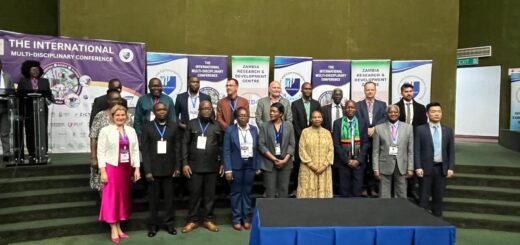Statement by the Hon. Minister of Finance Dr. Bwalya Ng’andu on further measures aimed at mitigating the impact of the Coronavirus (covid-19) on the Zambian economy – Monday 20th April 2020
Notice: Undefined index: catFilterList in /home/zambi/public_html/wp-content/plugins/wp-likes/api.php on line 243
-
REPUBLIC OF ZAMBIA
MINISTRY OF FINANCESTATEMENT BY THE HON. MINISTER OF FINANCE Dr. BWALYA NG’ANDU ON FURTHER
MEASURES AIMED AT MITIGATING THE IMPACT OF THE CORONAVIRUS
(COVID-19) ON THE ZAMBIAN ECONOMYAPRIL 2020
1.0 PREAMBLE
1. Good Morning Ladies and Gentlemen. Let me start by welcoming you all to this morning’s briefing at which we present our assessment of the impact of the Covid19 on economic performance. This is part of the ongoing effort to apprise the country of how we are impacted by this pandemic and it comes as a follow up to a similar briefing which we presented just over two weeks ago. At the same time the briefing presents a number of measures to assist in mitigating the negative impact of this pandemic. Some of these measures also have the potential to help businesses transition through this very difficult period that will be necessary for them to continue as viable businesses in the post Covid-19 era.
2. The Covid -19 pandemic, as we have come to learn, is both a health catastrophe as well as an economic catastrophe. It is however, important to understand that it is first a health challenge and an economic challenge only later. We must therefore, pay serious attention to all the measures that are intended to protect and preserve human life. As and when we pull through this episode of our lives, we will come together to rebuild our economy and restore our capacity to generate wealth. What we will not be able to do is to restore lives that we lose to this scourge and the human skills that will disappear with this loss. The speed with which we are able to revitalise our economy after the Covid-19 will partly depend on how well we preserve our human capital during this period.
3. Let us not lose sight of the fact that the health situation continues to be grave around the world. The latest update from the World Health Organization indicates that over 2.4 million confirmed cases have been recorded around the world from 470,000 at the time I issued my last statement. The number of deaths due to the virus are now estimated at more than 165,000 from 20,000 deaths three weeks ago. These statistics, Ladies and Gentlemen, not only speak to the severity of this pandemic but suggest that the fight against the pandemic could be a protracted one with severe consequences on the global economy.
4. Coming to Zambia we are witnessing disturbing developments as the virus has increased in terms of the number of people confirmed as positive and also in terms of its geographic spread. As at 19th April 2020, we had 61 confirmed cases, 33 recoveries and sadly, 3 deaths due to Covid-19. Unlike the situation at the time of my first briefing, the virus is no longer confined to Lusaka, but has spread to other parts including Kafue and Kabwe.
5. These developments call for a stern and deep reflection on the seriousness of the situation that we are faced with. At this moment the least we can do is to follow the guidelines stressed by His Excellency, the President when he recently extended the period of the current measures that all citizens should abide by the following:
i. Wear face masks at all times, particularly, in public places such as markets, buses, bus-stops and shopping malls;
ii. Practice high levels of personal hygiene especially washing or sanitising hands frequently;
iii. Cover mouths with a flexed elbow when coughing; iv. Use tissue when sneezing and carefully dispose it off in a bin; v. Avoid touching faces and no shaking of hands; and vi. Observe social distancing every time and everywhere while limiting movements. Above all, His Excellency emphasised the need to stay home in order to stay safe.6. This is a difficult fight which is being fought on our behalf by our doctors, nurses and other health workers who are at the front line. Whilst the rest of us are fighting Covid-19 by staying away, they are fighting it by facing it head on and in the process constantly putting their own health at risk. These are our heroes in this fight and they deserve our commendation and respect for the important health interventions they have been undertaking to contain the disease. I wish also to commend my colleagues, the Minister of Health and his team at the Ministry, for proving firm direction and leadership in dealing with the problem.
7. I would now like to call your attention to the impact of the pandemic on both the global economy and our own domestic economy. The international Monetary Fund (IMF) has projected that the world will record the worst economic fallout since the Great Depression of the 1930s. This crisis will be much worse than the 2007/2008 financial crises. Specifically, the global economy will grow at a negative 3% in 2020 while sub Saharan Africa is expected to grow at negative 1.6%. Further, projections show a drastic drop in per capita growth among countries. At the beginning of 2020, the IMF projected positive per capita growth for 160 countries. Now it is projecting that 170 countries will record negative per capita growth on account of the impact of COVID- 19. These projections are based on the assumption that the Covid-19 pandemic would have been cleared by the second half of 2020. If on the contrary it persists beyond that, the contraction of the global economy, including Zambia, could be worse than indicated.
8. In the case of Zambia, The IMF projects that the economy will grow by a negative 2.6% in 2020 from the earlier projection of 3.6%. The economic adjustments due to COVID-19 will result in a severe drop in revenue. It is estimated that the budgeted revenue will fall short of target by at least K14.8 billion or 19.7 % of the approved 2020 budget. The reduction by tax type, however, will be determined as more information unfolds.
9. Furthermore, this estimated impact does not include the revenue loss arising from the tax relief measures that I announced on 26th March 2020. It is based entirely on the expected economic adjustments due to COVID-19. In our projections, we have assumed that the peak period for impact of the Corona Virus on revenues is April and May. If we further assume that the pandemic will be quenched by August 2020, we project that the negative impact on revenue will continue until December 2020.
10. In addition, projections suggest that the reduction in the price of copper on the London Metal Exchange (LME) will continue until June resulting in a drop in mineral royalty and income tax payments from mining companies. Pay as You Earn (PAYE) from the mining sector is also expected to fall as some contractors may lose their contracts going forward. The scaling down of mining sector activities will lead to reduced engagement of foreign providers of management services, hence affecting Withholding tax receipts on management fees and consultancy.
11. The scaling down of economic activity is expected to cut across all sectors including manufacturing, transport, power generation and transmission, wholesale and retail trade, tourism and the hospitality industry in general. This will basically translate into a reduction in all tax and non-tax revenues among them PAYE, VAT, customs duty, excise duty, fuel levy, export duty, road user charges, fees and fines.
12. In response to these challenges, His Excellency the President of the Republic of Zambia has directed my Ministry to prioritise the saving of lives by providing the Ministry of Health with resources needed to undertake the fight against the pandemic in a timely manner. Furthermore, in order to prevent companies from collapsing under the weight of the current challenges, he has directed that both the Ministries of Finance and Commerce, Trade and Industry work out measures that will sustain businesses during this period.
13. In arriving at these measures, Government engaged various stakeholders, including the business community as well as bilateral partners on the possible interventions to mitigate the negative impacts of Covid-19.
2.0 ADDITIONAL MEASURES TAKEN TO MITIGATE THE IMPACT OF COVID-19
Tax Relief
14. Waiver of Tax Penalties and Interest: to assist companies and businesses manage their cash flows during this period when they are faced with reduced revenues, Government has decided to waive tax penalties and interest on outstanding tax liabilities resulting from the impact of Covid-19. The Zambia Revenue Authority will soon issue guidelines on the criteria on who qualifies, the period of relief and other related modalities.
15. Suspension of customs duties and VAT on additional medical supplies used in the fight against Covid-19: In order to expedite the provision of medical related devices needed to support the fight against Covid-19, Government will extend the list of medical supplies that are not subject to Import Duty and Value Added Tax for an initial period of 6 months. The complete list comprises 38 individual items which include testing equipment, protective garments, thermometers, disinfectants, sterilisation products and other medical equipment such as ventilators and patient monitoring devices. The full list of the affected items will be published by the Zambia Revenue Authority.
Easing of Liquidity
16. Tight liquidity conditions continue to impact on businesses and households, on one hand and the financial sector, on the other hand. To alleviate the economic pressures associated with the Covid-19 induced liquidity challenges and in particular to prevent liquidity constraints to financial institutions degenerating into a solvency problem, Government has already released:
a) K500 million to the Public Service Pensions Fund to pay over 1,500
retirees or their beneficiaries;
b) K170 million to Banks to clear third party arrears; and
c) K140 million to various road contractors.17. These releases are part of the K2.5 billion which had previously been announced by His Excellency in his last address to the nation. The Treasury will now focus on completing the ongoing verification exercise which will permit payment of K1 billion to various suppliers of goods and services to Government.
18. The financial sector’s liquidity challenges will further be ameliorated by tapping into the Bank of Zambia’s K10 billion medium-term refinancing facility which eligible commercial banks and non-bank financial institutions can access in order to restructure, refinance or extend credit to businesses and households impacted by Covid-19 on more favourable terms. The terms and conditions for accessing this facility have already been issued by the Bank of Zambia.
19. At this point it is necessary to acknowledge that even with the availability of the Bank of Zambia medium term refinancing facility, many businesses will still find themselves unable to honour their loan repayment obligations on account of the current massive contraction in business activity. Many businesses will fail to make their payments as and when they fall due not because they do not want to but because they cannot. To avert unnecessary business failures, foreclosures, liquidations and receivership, I would like to urge all lending institutions to exercise forbearance and where appropriate to consider giving moratorium on loan repayments for a prescribed period of time, capitalise interest repayments or even extend the period loan repayments periods.
Building new and sustainable value chains
20. The current situation provides Zambia with a new opportunity for domestic agricultural and locally manufactured products to be sold in great numbers in the major chain stores found in the shopping malls. At the same time we are faced with an opportunity as never before to begin to build distribution value chains for local products that are sustainable going forward.
21. Consequently, Government has established a taskforce comprising representatives of South African owners of chain stores, on one hand, and the Zambia Association of Manufactures (ZAM), Zambia Farmers Union (ZNFU) and the Zambia Chamber of Commerce and Industry, on the other. The mandate of this Task Force is clear. It is to bring more Zambian products on the floors of these shops in order to support domestic production which has previously been hindered by the lack of a reliable market. This should not only increase domestic production and sale of agro-processed and manufactured products but lead to the substitution of as many imports as possible with locally produced goods. It is important to
point out that starting this exercise with the major chain stores is only the first step in an initiative that will be extended to all economic sectors.Engagement with Multilateral Organisations
22. A number of multilateral institutions have announced various windows under which they will give emergency support facilities to mitigate the impact of Covid-19. The IMF which has four different windows has already disbursed support to 25 countries under the Catastrophic Containment and Relief Facility (CCRT). The eligibility criteria requires that a country’s per capita income be below the International Development Association’s operational cut off, which is currently at US$1,175. Zambia, being a middle income country and with a per capita of $1,539, does not qualify for support under the Catastrophic Containment and Relief Trust. However, we are engaging the IMF with the view to benefit from other appropriate facilities to which Zambia qualifies. With respect to an economic programme, Zambia has just completed a two-week virtual mission with the IMF at which an assessment of the macroeconomic and fiscal situation was undertaken. This follows Zambia’s request for an economic programme with the IMF which was made at the end of 2019. On the basis of the Mission’s outcome, Zambia will now discuss with the fund on an appropriate macroeconomic framework that may lead to a programme.
23. In addition, Zambia has applied to the World Bank, the African Development Bank and Afreximbank to be considered for support under their various Covid-19 Emergency Funds. Bilateral discussions have also commenced with a number of G20 countries on the postponement or rescheduling of debt service payments over a period to be agreed. Engagement with the bilateral partners center around the possibility of them meeting the financing gap arising from the adverse effects of Covid-19 on the fiscus. I will provide an update as and when we reach agreements.
3.0 HANDLING OF FUNDING TOWARDS COVID-19 RESPONSE
24. Lastly I want to thank various stakeholders that have supplemented Government’s efforts in the fight against Covid-19 through their donations either in kind or in monetary terms. As we receive this support I want to assure all those who have donated and those who intend to donate, that what is received will be fully accounted for. I have directed the Controller of Internal Audit to ensure that what is donated in the name of Covid-19 is applied exclusively to Covid-19 related activities. Controlling officers who are required to give proper account of what they receive will face the necessary and prescribed sanctions should they fail to do so.
I will at some point give chance to the Secretary to the Treasury to talk about the measures that are being implemented to ensure transparency and accountability.
4.0 CONCLUSION
25. As I indicated in my first statement, the Government will continue to assess the situation and implement appropriate measures as the Covid-19 situation evolves. We will inform the public on the progress of the measures as we implement them. I also want to urge the private sector to continue to engage Government on further initiatives to help businesses pull through the current challenges. Please remember to stay safe by staying at home unless you absolutely need to be away from home.
I thank you and may God bless our great nation. – Dr. Bwalya Ng’andu
























